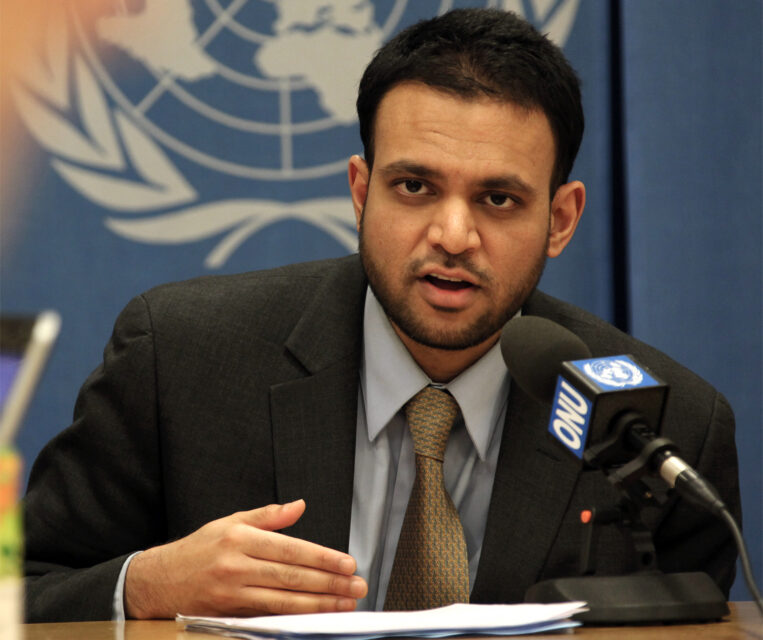(RNS) — On Wednesday (Nov. 17), U.S. Secretary of State Antony Blinken released the federal government’s blacklist of the worst religious freedom violators in the world, known more officially as the “country of particular concern” list. The announcement made clear the world is a dangerous place for religious freedom. It’s not news to the many individuals, of all faiths and none, in nearly every corner of the globe, who experience severe religious freedom limitations.
The State Department report is only one part of how the United States advocates for international religious freedom. Since 1998, when Congress passed the bipartisan International Religious Freedom Act, a special ambassador has led U.S. diplomatic efforts in promoting and protecting religious freedom abroad.
Since the end of the Trump administration, this post has been empty. To ensure American values and interests remain at the forefront of the religious freedom fight, the Senate should confirm Rashad Hussain, President Joe Biden’s nominee for ambassador-at-large for international religious freedom, before Christmas.
For almost a quarter of a century, advocating for the right of freedom of thought, conscience, religion or belief has been a diplomatic distinctive of the United States. Respecting the right for all is a foundational part of the American story, and promoting religious freedom abroad advances U.S. foreign policy objectives.
RELATED: Russia added to State Department list of worst religious liberty violators
But it’s more than American ideals that are at stake. The right to religious freedom is essential to billions of people. The Pew Research Center has found that 80% of the world believes in God or a higher power, while at the same time reporting that religious freedom is a right in peril: Almost two-thirds of humanity lives in countries with restrictions on the practice of faith, according to Pew studies.
The combination is a recipe for instability, violent religious extremism and human rights abuses.
Blinken’s announcement shows precisely why the State Department needs its point person on religious freedom speedily confirmed. While mainly a continuation of previous designations, this year’s blacklist had glaring shortcomings. For unspecified reasons, the secretary inexplicably removed Nigeria from the list despite ongoing attacks on Christians, the kidnapping of Christian women and girls, and government violence against Muslims.
India continued to avoid any mention, despite violence targeting Muslims, discriminatory policies and the closure of churches.
From my contacts, it is clear the absence of the ambassador appointee left no strong advocate for religious freedom during internal debates at State, thus slanting the table toward the department’s powerful regional offices.
It’s imperative, then, that, the Senate quickly confirm Hussain to the post. Having worked with the nominee, I can speak to Hussain’s diplomatic experience and commitment to religious freedom for all. He will be a dedicated and diligent advocate for the persecuted. His testimony during his Senate confirmation hearing demonstrated his constructive approach, pledging to continue many of the positive initiatives of his predecessors.
I’ve seen Hussain conduct skillful diplomacy against international blasphemy laws, advocate for persecuted Christian converts and push for stronger U.S. policies. He is highly qualified and ready to hit the ground running.
Don’t take my word alone: Former President Donald Trump’s ambassador, Sam Brownback, tweeted out a call for quick Senate action earlier this month, while David Saperstein, who held the post under former President Barack Obama, backed Hussain’s nomination in a joint op-ed with conservative Robert P. George, a past chair of the U.S. Commission on International Religious Freedom.
Former USCIRF Chair Katrina Lantos-Swett expressed support for Hussain, and USCIRF’s current leadership endorsed him for the job. He’s gotten support from a diverse array of groups, including the Religious Freedom Institute, Open Doors, the American Jewish Committee, Christian Solidarity Worldwide, the Anti-Defamation League, International Christian Concern and other religious freedom advocates.
RELATED: Rashad Hussain faces Senate committee on historic nomination
The first Muslim nominated for the position, Hussain will likely face intense scrutiny from some quarters about his faith. It’s ugly and unfair, unlike anything previous ambassadors, all people of deep religious conviction, have experienced. The correct approach is to focus on qualifications and track record.
The United States has a noble tradition of advocating for the right of all people to seek ultimate truth as their conscience leads, free from fear or harm. The job of the religious freedom ambassador is critically important. U.S. leadership is essential to stem the tide of rising religious persecution. Hussain’s confirmation by Christmas would ensure robust American engagement when it is needed most.
(Knox Thames last served as the special adviser for religious minorities in the Obama and Trump administrations. He is writing a book about global persecution. Follow him on Twitter @KnoxThames. The views expressed in this commentary do not necessarily reflect those of Religion News Service.)





